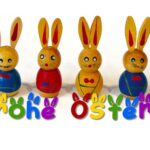Many people in Germany mark the crucifixion of Jesus by participating in church services and processions on Good Friday (Karfreitag), which is two days before Easter Sunday. For others, it is the start of a long weekend and possibly a spring vacation. Good Friday is a public holiday in all German states. Post offices, banks, stores and other businesses are closed. However, some tourist stores may be open and stores at railway stations, airports and along highways are usually open.
There are some restrictions on selling alcohol, public performances and dancing. Public transport services may run as usual, a reduced service or no service depending on where one lives or wants to travel.
Important Good Friday symbols are images of the cross used during Jesus’ crucifixion and of Jesus on the cross. The cross that is normally on the altar or wall is placed on a carpet or piece of cloth on the floor in many churches. In areas with a Good Friday procession or play, the cross or crosses used as props may be left in place for the whole Easter weekend.
Some people attend special church services on Good Friday. It is customary in some churches and areas that the church organ and bells are not played on Good Friday. Instead musical rattles are used to announce the start of the services and accompany the hymns.
For others, Good Friday is the start of a long weekend that also includes Easter Monday. They may take a short break or longer vacation in Germany or a neighboring country. It is still possible to ski at Easter in some years and regions but in others it is the start of the sailing season. Some high profile car races are also held on Good Friday.
Religious processions or plays are held in the open air in many areas. These tell the story of the last events leading up to Jesus’ crucifixion. It is customary to eat fish instead of meat because Good Friday is a fast day for many Christians. Try these wonderful Fish Cakes with Green Sauce.
Related articles:
How Germany Celebrates Easter: Traditions That Are Older Than Christianity
How to celebrate Easter like a German
Easter Monday – Ostermontag









